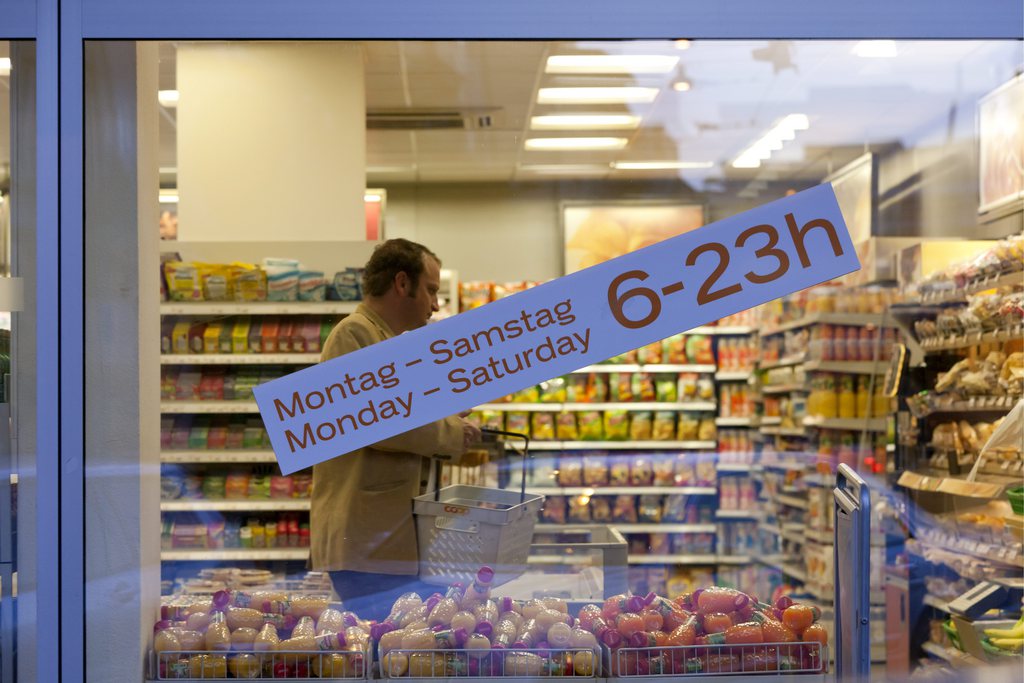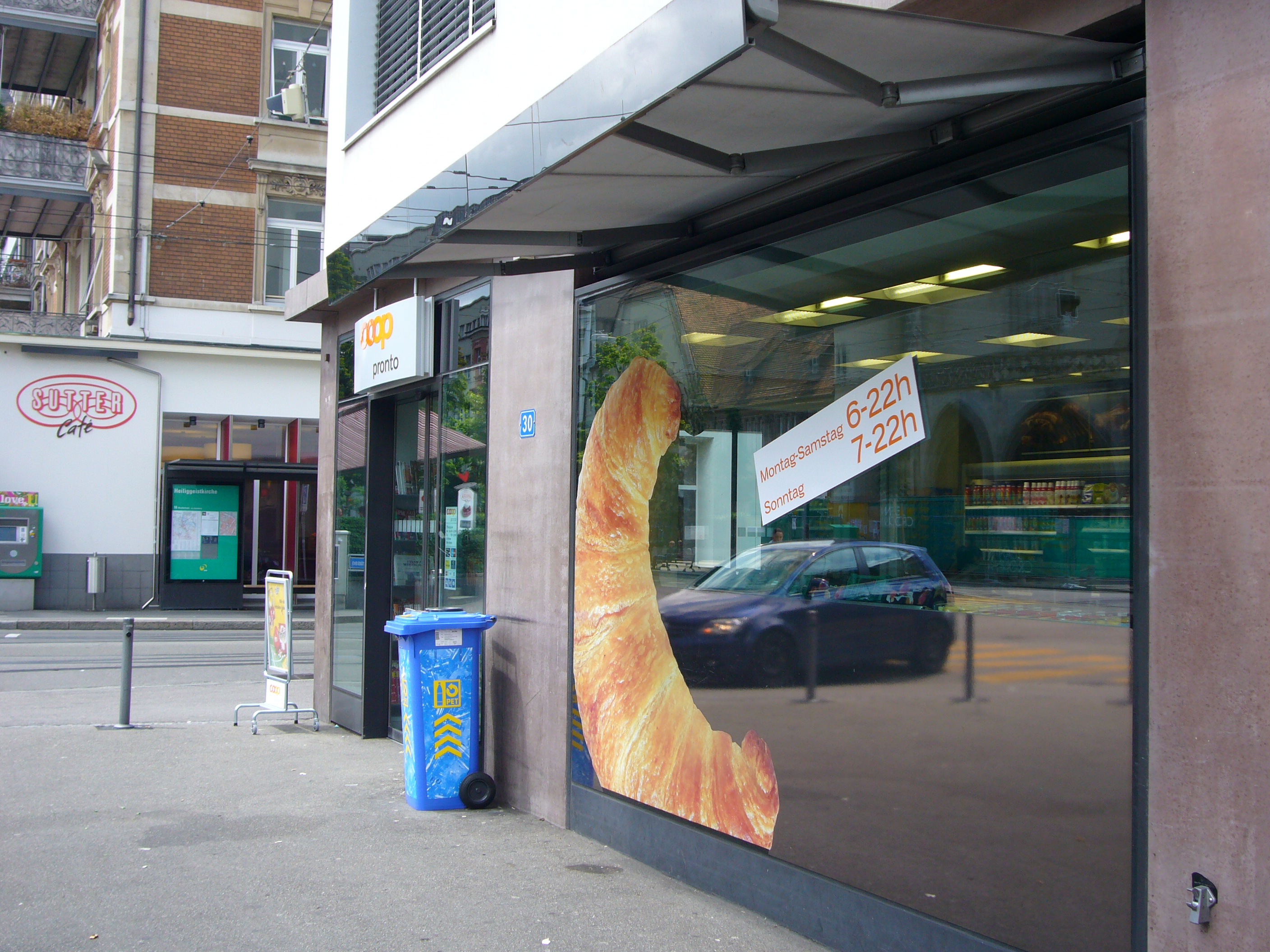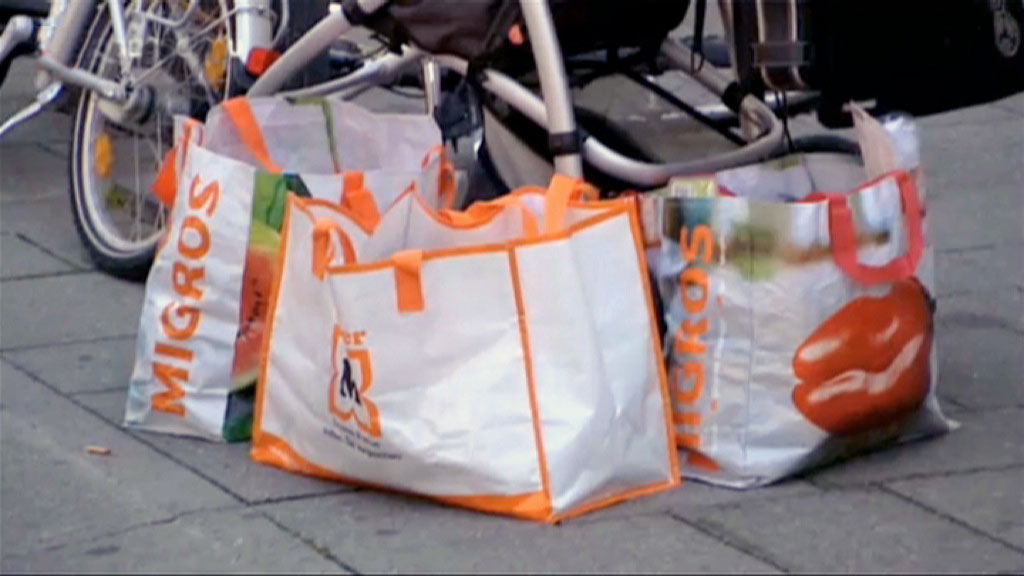Store opening hours: a regular vote topic

Hardly a voting weekend goes by in Switzerland without voters being asked to decide at a local, cantonal or federal level on shop opening times. The fact that stores aren’t open for as long as they are abroad is partly down to direct democracy.
Not being able to buy groceries because the shops are closed on Sundays and during the week after 6.30pm in many places in Switzerland has surprised and irritated many visitors.
But Eva Geel of the Unia trade union sees things differently. “Switzerland has not gone along with the mistaken developments in other countries,” she told swissinfo.ch. “With our direct democracy – the opportunity to have initiatives and referendums – we have an instrument that has been able to counter the wave of deregulation that has engulfed Europe since the1990s.”
The unions make regular use of this instrument, both at cantonal and national level, usually with success. “In 90 per cent of votes the people have said no to deregulation of night and Sunday work,” she said.
Thus at the weekend in canton Zürich, voters clearly rejected the popular initiative, “The Customer is King”, launched by the centre-right Radical Party (71 per cent against). The promoters were advocating complete liberalisation of opening hours.
For their part, voters in canton Lucerne turned down a proposal to extend opening hours, like they did six years ago. It’s likely that Lucerne voters will have to pronounce again on a similar initiative of the Radicals next year.
Creeping liberalisation
Swiss shops can open Monday to Friday from 6am to 11pm. However, the cantons have to defer to labour law which takes precedence and which protects the interests of workers. Most cantons have set out further restrictions in their laws on retail trading hours.
Though still more restrictive than in the rest of Europe, Swiss retail opening hours have been loosening bit by bit in the past few years. Shops at petrol stations or at railway stations – a lot of these have sprung up recently – or businesses that employ family members are now allowed to stay open for longer. Airports and tourist resorts are also granted an exception.
Geel said the fact that longer hours remain a political issue, although voters usually turn the idea down, is a reflection of the distribution wars going on between retailers, mostly at the expense of the smaller ones.
“Independent retailers are being driven to the wall because they can’t afford the long opening hours. Their staffing costs are too high and the turnover is too low,” she said.
Pressure to work late
“If people want to shop at night or on Sundays, they should be aware that it’s at the expense of retail workers. These people usually have not volunteered to be sitting at the cash desk. With the constant extension of retail opening hours, sales staff are being deprived of free time to spend with family and friends or participate in associations or the community at large.”
Sales staff have given Unia a clear mandate in every survey they have done, she says. “Shop assistants do not want longer opening hours.”
This is why Unia is challenging the plan of Radical Party parliamentarian Christian Lüscher, which calls for 24-hour service at petrol station shops.
The union is getting support from the Swiss Retailers’ Association. This trade lobby is also against the proposal, “because some of the market players would get an unfair advantage in the fierce competition of the retail trade”, while independent retailers are dealing with “sinking profit margins and perilously low turnovers”, the lobby said in its campaign manifesto.
Cross-border shopping
With the major retailers it’s a different story: they support all political efforts to relax retail opening hours.
Particularly active in favour of deregulation is the Retail Trade Interest Group, the lobby of the big supermarket chains such as Migros and Coop. The reason for this intensive lobbying is competition from across the border.
“Our biggest problem is Saturdays, when people drive across the border and do their week’s shopping,” Migros’ lobbyist Martin Schläpfer told swissinfo.ch.
“The Germans have filled up the southern border region, which is not all that heavily populated, with Aldi, Lidl and other discount shopping centres.”
This strategy is aimed at Swiss customers. “Swiss are spending a billion [francs] on meat outside the country,” he complained, adding that the cross-border shopping trend had never been as strong as it was now.
“Individual customs declarations on the border with Germany in the Basel region in 2011 increased by 67 per cent.”
Government action
Causing this is not just the strong franc, but the more liberal opening hours on the German side of the border.
“We want the federal government here to do something to harmonise retail opening hours – after all, Switzerland is a single economy,” Schläpfer said.
To put it concretely, he wants Monday to Friday, 7am to 8pm, one late opening in the evening per week until 9pm and the right to open four Sundays a year.
In mid-May, the federal government responded to a proposal in this direction by Liberal parliamentarian Christian Wasserfallen by saying it would prefer retail opening hours to not be regulated at national level but left up to the cantons.
“We are disappointed in the minister, Johann Schneider-Ammann. What is happening at the border should be of interest to the economics minister of the country,” said Schläpfer, who warned of job losses. “Retail is a labour-intensive industry.”
The fact that employees are not enthusiastic about longer opening hours when asked in surveys is changing, he said.
“Staff have tended to be conservative about this, but previously job security was not an issue for them. Now we find ourselves in a new era of the strong franc.”
The Consumer Protection Foundation in German-speaking Switzerland is not for or against longer opening hours in principle, its head Sara Stalder told swissinfo.ch. “We do think it’s a good thing if all cantons are playing by the same rules,” she said. The needs of particular regions could still be taken into account.
The group is in favour of standard hours for businesses to be open. “That gives the consumers some security. But anything beyond that needs to be decided in particular cases,” Stalder said. “Many consumers do not favour extension of retail outlets’ opening hours at the expense of the people who work there. These people are not always doing well economically and are vulnerable to pressure from employers.”
The group is taking a “cautiously favourable” attitude to a proposal to have petrol station shops open 24 hours with a larger range of goods. “It’s a difficult situation to understand when travellers and tourists find shelves closed at certain times because only part of the range of goods can lawfully be sold,” says Stalder.
Germany
Regulating store hours is a matter for the federal states. Nationwide uniform regulations on Sunday and holiday closing are included in labour law. In Switzerland’s neighbouring state of Baden-Württemberg, the legal opening hours are: weekdays: 24 hours; up to three Sundays and holidays a year.
Austria
According to law, businesses can open from Monday to Friday between 6am and 9pm, and on Saturdays until 6pm. On Sundays they must close. But there are numerous exceptions. Opening hours can be extended by decision of the state governor. If there is a particular regional need, businesses can be allowed to stay open on Saturday after 6pm and to open on Sundays and holidays.
France
As regards weekday opening, there is no legal restriction. In smaller centres there is a lunch-hour closure. Supermarkets are typically open from 9am to 8 or 9pm. On Sundays and holidays, small businesses are allowed to open. Employees have particular protection, though. In many centres large shops and supermarkets also have the right to be open on these days.
Italy
Since 2012, retail opening hours are completely unregulated. Businesses can be open around the clock if they wish.
(Translated from German by Terence MacNamee)

In compliance with the JTI standards
More: SWI swissinfo.ch certified by the Journalism Trust Initiative






You can find an overview of ongoing debates with our journalists here. Please join us!
If you want to start a conversation about a topic raised in this article or want to report factual errors, email us at english@swissinfo.ch.